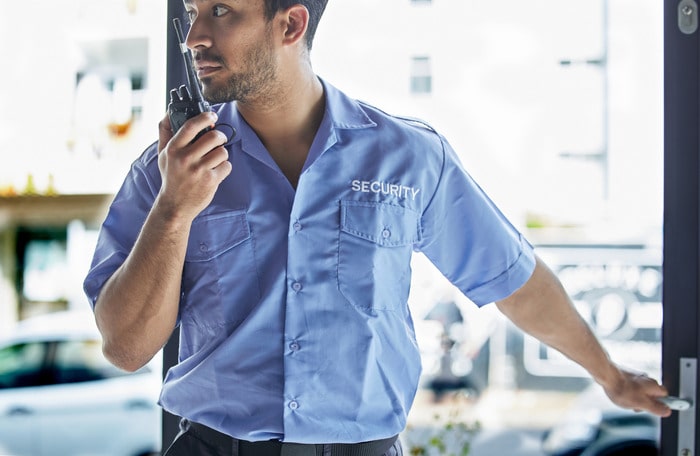
- September 24, 2023
- |security guard company
- | 0
- 406
Upholding Integrity: The Code of Conduct –
Security guards in Arizona hold a significant responsibility in safeguarding people, property, and assets. To excel in their roles and maintain trust within their communities, they must adhere to a strict code of conduct and professionalism.
This code ensures that security personnel operate ethically, effectively, and with the utmost integrity. In this article, we will explore the code of conduct and professionalism expected from security guards in Arizona. At XPressGuards, an Arizona-based security guard company, we emphasize these principles to provide the highest level of security services to our clients.
The Role of Security Guards
Security guards are entrusted with the safety and security of individuals and property. Their duties vary depending on the specific assignment but typically include:
1. Crime Deterrence: Deterrence of criminal activities such as theft, vandalism, and trespassing through visible presence and vigilance.
2. Access Control: Managing entry and exit points, verifying credentials, and preventing unauthorized access.
3. Surveillance: Monitoring surveillance cameras, patrolling, and reporting any suspicious activities or incidents.
4. Conflict Resolution: De-escalating conflicts and confrontations to maintain a peaceful environment.
5. Emergency Response: Responding promptly and effectively to emergencies, including medical situations, fires, or security breaches.
Code of Conduct and Professionalism for Security Guards
1. Honesty and Integrity: Security guards must be honest and maintain the highest levels of integrity in their actions, reporting, and interactions with others. They should avoid any form of dishonesty, including theft or deception.
2. Professional Appearance: Guards are expected to present themselves in a professional manner by wearing their uniforms neatly and maintaining good personal hygiene.
3. Punctuality: Being punctual is crucial for security guards as they often relieve colleagues or work in shifts. Arriving on time ensures the smooth transition of duties.
4. Respect for All: Security personnel must treat everyone with respect and dignity, regardless of their background, appearance, or circumstances. Discrimination or harassment is unacceptable.
5. Confidentiality: Guards may come across sensitive information during their duties. They are expected to maintain strict confidentiality and not disclose any information to unauthorized parties.
6. Effective Communication: Security guards should communicate effectively, both verbally and in writing, to convey information clearly and concisely.
7. Calm and Professional Demeanor: Even in challenging situations, security personnel are expected to maintain a calm and professional demeanor, avoiding aggressive behavior.
8. Conflict Resolution Skills: Guards must possess conflict resolution skills to de-escalate confrontations and disputes without resorting to physical force.
9. Adherence to Laws and Regulations: Security guards are required to understand and adhere to all applicable laws and regulations governing their roles, including those related to the use of force and privacy.
10. Accountability: Security personnel are accountable for their actions, decisions, and the consequences thereof. They should accept responsibility for their duties and any mistakes made.
Importance of Professionalism in Security
1. Trustworthiness: A professional security guard is seen as trustworthy by clients and the public. Trust is a cornerstone of effective security services.
2. Client Satisfaction: Professionalism enhances client satisfaction, as clients are more likely to feel confident in the services provided by guards who exhibit professionalism.
3. Conflict Resolution: A professional demeanor is essential for effective conflict resolution. Guards who remain calm and professional are better equipped to handle disputes and de-escalate situations.
4. Team Collaboration: In security teams, professionalism fosters collaboration and effective communication, leading to better outcomes in security operations.
5. Legal Compliance: Professionalism ensures that guards operate within legal boundaries, reducing the risk of legal consequences for both the guard and the client.
Challenges and Ethical Dilemmas for Security Guards in Arizona
Security guards may face various challenges and ethical dilemmas while performing their duties:
1. Balancing Act: Guards must balance providing security and enforcing rules while maintaining a welcoming and non-threatening atmosphere.
2. Use of Force: Deciding when and how to use force in self-defense or protection of others is a complex ethical issue that security guards may confront.
3. Reporting Misconduct: Guards may witness unethical or illegal behavior by colleagues or supervisors. Ethical responsibility requires reporting such misconduct, even if it involves internal issues within the security company.
4. Privacy Concerns: Balancing security with privacy concerns, especially when conducting searches or surveillance, can be ethically challenging.
Security guards in Arizona are entrusted with critical responsibilities in maintaining safety and security. Adhering to a code of conduct and professionalism is essential for building trust, fostering a safe environment, and ensuring the effective provision of security services.
At XPressGuards, we prioritize these principles, as they are fundamental to our commitment to providing the highest level of security services to our clients in Arizona. Security guards who embrace professionalism and adhere to a strict code of conduct not only safeguard property and individuals but also uphold the integrity of the security industry as a whole. Contact us to learn more.



